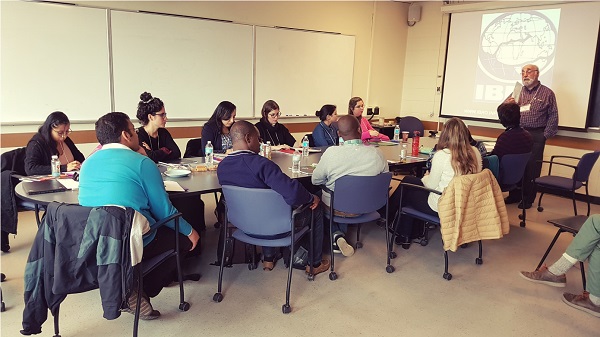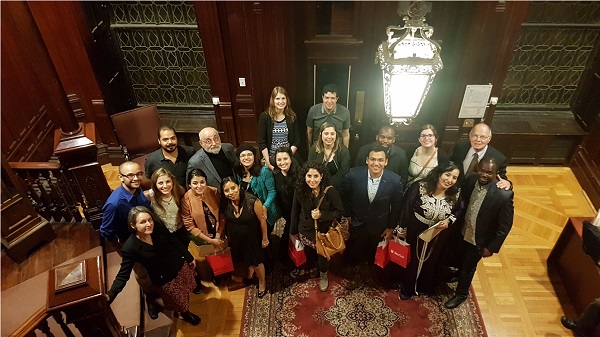The 11th Canadian IBRO School of Neuroscience – Development, Plasticity, and Repair of Neural Circuit - took place from May 11 – 31, 2017 at McGill University, Montreal, QC.

A.J. Aguayo talking about IBRO
Following the well-established model of 10 previous schools, this school was designed for young, promising trainees in experimental and clinical neuroscience, from Africa and Latin America. Unique amongst the IBRO schools, the students were brought to Canada instead of tutors traveling to their home countries.
The students were staying in the same building – Royal Victoria College Residence on the campus that provided more opportunities for interaction amongst the participants. Considering the busy whole day schedule of the school this has never been an issue. Local graduate student and post-doctoral help were an important and reliable support group of the school.

After the dinner at the atrium of the Faculty Club of McGill University
The school was sponsored by IBRO (including its North American chapter consisting of Society for Neuroscience, the National Academies of Science), INMHA, Canadian Association for Neuroscience, INMHA, CIHR), Montreal Neurological Institute, McGill University, Department of Neurology and Neurosurgery, McGill University.
The Students
Twelve students were selected by the Organizing Committee of Canadian IBRO Schools and confirmed by the members of IBRO Regional Committees for Africa (ARC) and Latin America (LARC), based on a competitive processing of over 150 candidates. The list included graduate students, postdoctoral trainees and junior staff from Argentina, Brazil, Egypt, Mexico, Morocco, Nigeria and South Africa. Priority was given to IBRO alumni, i.e. candidates who have previously attended an IBRO school and were already identified as promising and independent scientists, trainees, clinical trainees with potential for development and growth. Two alumni of previous Canadian schools have been amongst the selected.
The arduous work of the selection committees paid off. One of the main reasons for the success of the school was the quality of students. They were highly motivated and invariably very active participants in all aspects of the school, often surprising the tutors with astute and pointed questions.
The complicated arrangements required to bring the selected students to Canada were efficiently managed by Grace Fowler (House of Travel, Montreal).
The Faculty
Most of the faculty were members of staff at McGill University with additions from Université de Montréal. They were selected not only for their expertise but also for their interest in mentoring the students and availability to spend at least three days with the students. Many have been on the faculty of previous IBRO schools in Montreal.
Educational objectives of the school
1. To deepen participants’ understanding of selected basic mechanisms related to to development, plasticity, and repair of neural circuits, through lectures and laboratory visits.
2. To acquaint the participants with a variety of experimental approaches and analytical tools applied on different model system, in particular through additional four days of individual lab experience.
3. Provide an opportunity for students to present their research; tutor students in the analysis of data and literature.
4. Provide general education of scientists, trainees, clinical trainees (such as preparation of research applications, presentations, manuscripts, etc.). Two sessions were dedicated to discussion about science and ethics of scientific research.
5. Establish mentorship – the potential nuclei of expertise and activities in developing areas.
6. To forge new contacts between investigators in Canada, Africa, and Latin America.
The Program
(Please consult the attached Welcome Package for details).
In spite of a wide range of experience and background amongst the students, the sessions managed to provide a balance between general issues vs details in both basic science and occasional clinical aspect of a topic - well appreciated by the students. This was as much a result of educational prowess and previous experience with IBRO School of the faculty as it was a result of coordination amongst the lectures.
• Daily 30–60 min discussion periods summarized the experience of the day and the “take home message”. It often extended to discussion about the general issues of research problems and methods.
• All students were provided with an opportunity to present the poster of their research followed by lively discussions. This was a rewarding experience for presenters and for tutors alike and demonstrated again the high quality of the class.
• Two sessions were dedicated to discussion about science and ethics of scientific research.
• Social activities – every free evening …
A new component of the school was made possible by additional funds, requested and approved by the IBRO NACARC. Each student was offered to select a lab where they spent four days with hands-on experience of experimental approaches of their interest. All students considered this stay to be one of the most important components of the School, so much so that four students extended their lab experience after the end of the school, also covered by the budget. One of them managed to arrange for a postdoctoral placement.
CAN Meeting
Attendance of the Canadian Association for Neuroscience (CAN) meeting (May 28 – 31, 2017) was again part of the program were all students presented posters of their research. (The Organizing Committee of Canadian IBRO Schools presented a poster summarizing the 10 years of the program; poster attached to the report). In addition, the students attended a satellite meeting on recent developments in Photonics, free attendance, courtesy of the organizers. The students had an opportunity to meet Dr Lnda B Buck, Nobel Prize 2000, Mrs Margaret Trudeau, Public Speaker and activist for mental health and Dr Freda Miller, President of CAN.
Other…
The Montreal School was offered the use of Dropbox that served as a repository of all learning material used in the school, such as slides of all lectures, articles in PDF format selected by the tutors, Photo Gallery are expected to contribute to further development of the community since the site remains open and is already used by the students.
Concluding comments
As is customary with all IBRO Schools, on the last day the students elected a Class President (Maria Bringas, Mexico) and a Vice-President (Luis Santos, Argentina).
At the final dinner of the school, each student received a certificate confirming her/his status of IBRO Alumna/Alumnus. Many students took the stand and were heard expressing their appreciation for what they have learned - about neuroscience, about Canada and about their peers and tutors.
Once again, this and other Canadian IBRO Schools offer a variety of experience for attending students that compares favorably with other forms of IBRO Schools.
Ante L. Padjen
McGill University
|


